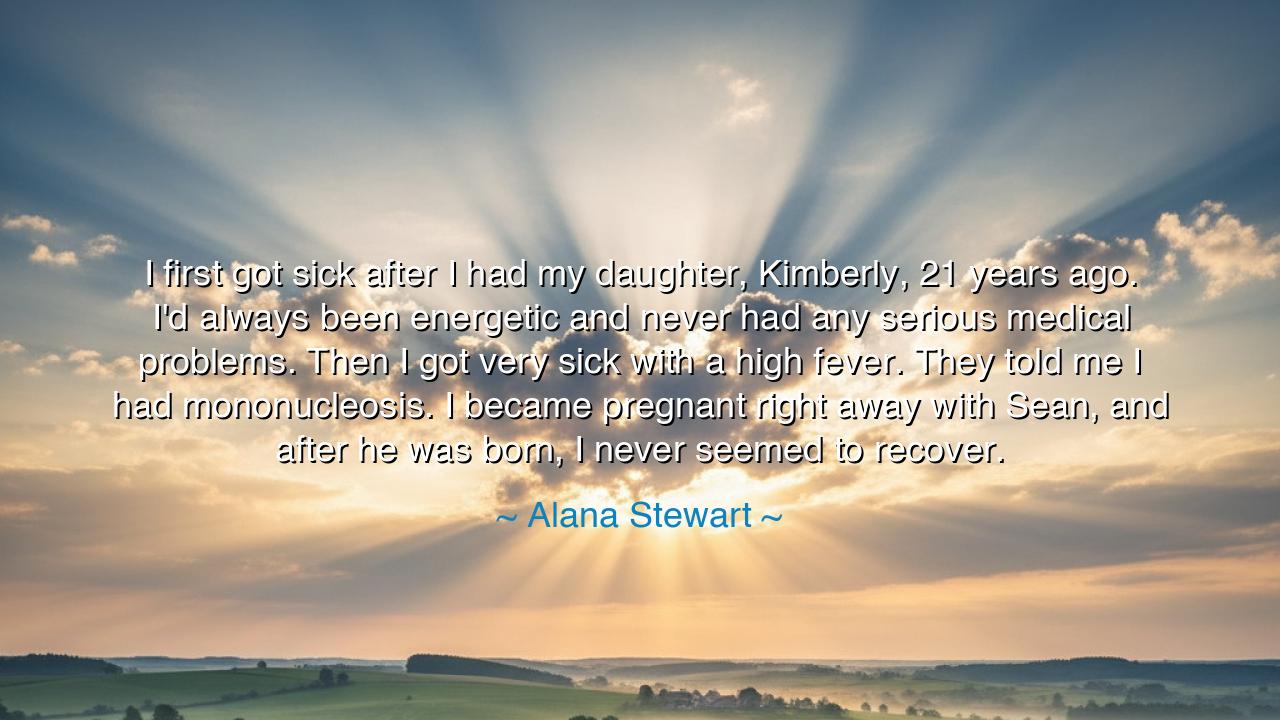
I first got sick after I had my daughter, Kimberly, 21 years ago.
I first got sick after I had my daughter, Kimberly, 21 years ago. I'd always been energetic and never had any serious medical problems. Then I got very sick with a high fever. They told me I had mononucleosis. I became pregnant right away with Sean, and after he was born, I never seemed to recover.






“I first got sick after I had my daughter, Kimberly, 21 years ago. I'd always been energetic and never had any serious medical problems. Then I got very sick with a high fever. They told me I had mononucleosis. I became pregnant right away with Sean, and after he was born, I never seemed to recover.” Thus spoke Alana Stewart, not merely recounting an illness, but unveiling a journey through human fragility, endurance, and the mysterious resilience of the soul. Her words are quiet yet powerful — a testament to how the body may falter even as the spirit continues to fight. For in them, we hear the universal story of suffering: how a moment of sickness can awaken within us both despair and awakening, loss and rebirth.
Alana’s story begins not in weakness but in strength. She was energetic, vibrant, and full of life — the kind of spirit that seems unbreakable. Yet illness, like a sudden storm, does not ask permission to arrive. It comes to test the foundations of our being. The fever she describes is more than physical; it is symbolic of the trial that strips away illusion and pride, revealing the raw essence of human endurance. When she says, “I never seemed to recover,” she speaks not just of lingering sickness, but of a life transformed — a shift from the confident rhythms of youth to the quiet strength of survival.
The ancients often spoke of illness as a teacher — a stern but honest one. For through pain, they said, we come to know the limits of flesh and the boundlessness of spirit. Alana Stewart, through her suffering, learned what philosophers and saints have long proclaimed: that the measure of life is not in health or ease, but in the courage with which we face affliction. When the body weakens, the soul is called to rise. And so, what begins as an account of sickness becomes a parable of endurance, the song of one who learned to live within limitation, to find strength in gentleness and wisdom in loss.
Consider the story of Frida Kahlo, the artist whose body was ravaged by pain after a terrible accident. Like Alana, she was once full of vigor, and like Alana, she found herself bound to a body that refused to heal. Yet from her suffering, she created beauty that still moves the hearts of millions. Her art became her medicine, her defiance, her testament. She once wrote, “I am not sick. I am broken. But I am happy as long as I can paint.” So too does Alana’s story remind us that even when recovery never comes, there remains a way to live — to create, to love, to serve. The soul that accepts its wounds does not surrender; it transcends.
When Alana says, “I became pregnant right away with Sean,” there is tenderness in her tone — a reminder that life continues to bloom even amidst suffering. Motherhood became intertwined with illness, joy mingled with weakness. In this duality lies the profound mystery of human existence: that we can hold both pain and love at once, both loss and creation. The ancient mothers of every age — from Demeter mourning Persephone to Mary standing at the cross — have known this truth. They have lived in the space between agony and devotion, where endurance becomes sacred.
The wisdom in Alana’s reflection is not merely personal; it speaks to all who have faced unseen battles. Illness, whether of body or mind, humbles us. It strips away our illusions of control, leaving only what is real: patience, gratitude, and the unyielding will to live another day. Those who suffer learn compassion. They look upon others not with judgment, but with gentleness, for they have seen what lies behind the mask of strength. Alana’s quiet remembrance is thus not a lament, but an offering — a lesson in grace, humility, and perseverance.
So, my children, remember this: to live is to face both health and frailty, joy and sorrow, vigor and weariness. When sickness comes, do not see it as punishment, but as a passage — a bridge between the known and the unknown, between what you were and what you might yet become. Care for your body, yes, but tend also to your spirit, for that is where true recovery begins. And when others falter, offer them not pity, but respect — for those who endure long illness are among the bravest of souls.
Let the legacy of Alana Stewart’s words remind you: even when the body does not heal, the heart can grow stronger. Even when recovery seems beyond reach, understanding and compassion can take its place. Life may wound, but it also teaches — and in the end, the greatest victory is not the return of strength, but the refusal to lose hope. In endurance, there is triumph. In weakness, there is wisdom. In pain, there is the quiet revelation of the human spirit.






AAdministratorAdministrator
Welcome, honored guests. Please leave a comment, we will respond soon